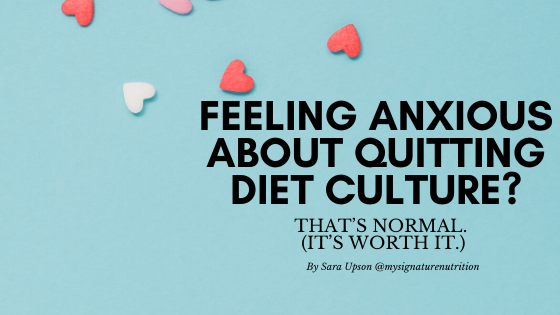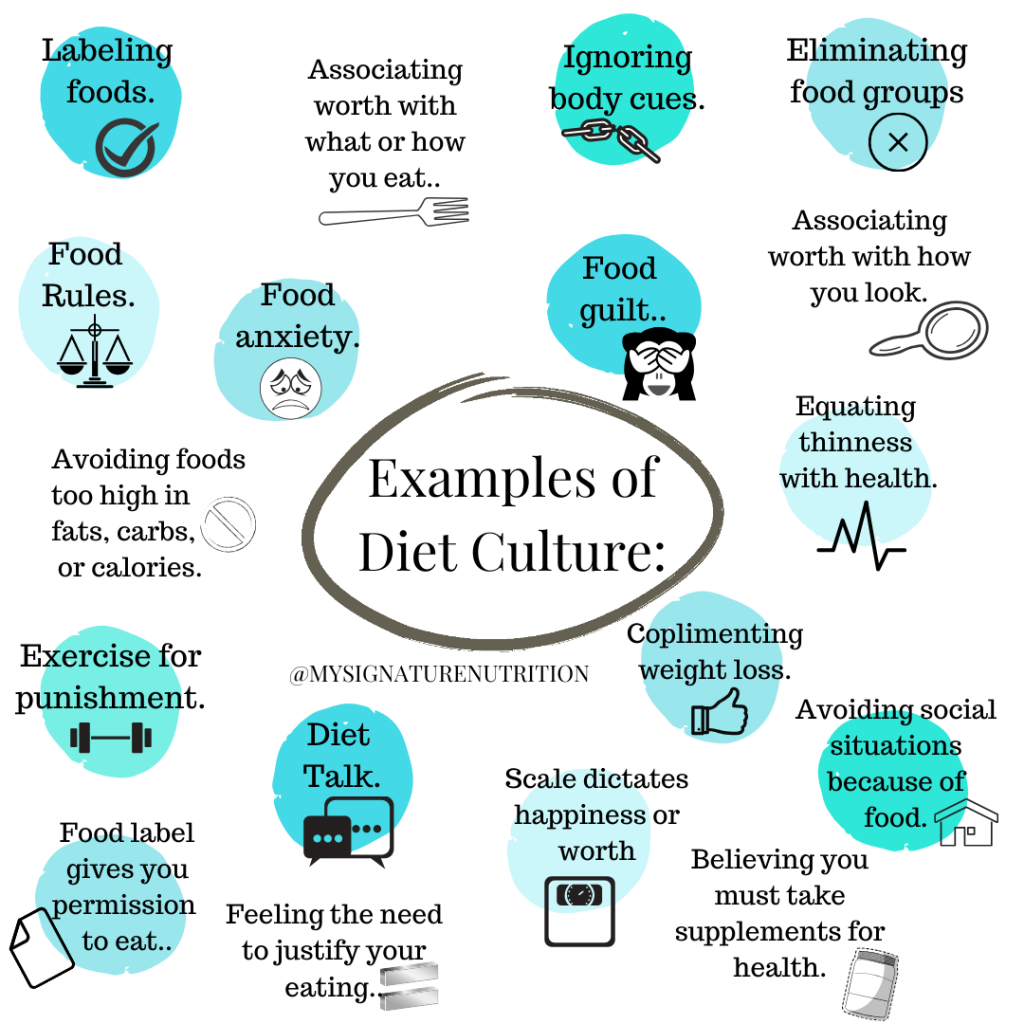Feeling anxious about quitting diet culture? That’s normal. (It’s worth it.)
January 20th, 2020 by Sara Upson

Imagine if there was a product or industry that failed 95-98% of the time and then you were blamed for the product failing…It’d be unbelievable, right?! For example, imagine getting into an elevator where the cable broke 95-98% of the time- and then you survive but the elevator technician blames you for breaking the elevator- when all you (and the other people did) was get on the elevator.
Now imagine a product or industry that fails 95-98% of the time that is popular, touted as health promoting, often applauded by health care professionals, promoted by celebrities, the primary topic of conversation among friends and family, always in the news and blames you for failing. It’s ludicrous to think a product like that would exist- but it does.
Curious what it is? Dieting + the system at large, diet culture.
Diets fail 95-98% of the time meaning that someone can lose weight on a diet but then 95-98% of people will gain the weight back with 66% gaining back more than they lost. When a government task force was looking for a diet to recommend for long term weight loss, they concluded, “It appears that dieters who manage to sustain a weight loss are the rare exception rather than the rule. Dieters who gain back more weight than they lost may very well be the norm, rather than an unlucky minority.”
Yet, despite evidence dating back to the 1950s that diets don’t work, are harmful, and don’t improve health- they’re still recommended. Crazy, right?!
Sadly, it exemplifies the power of diet culture. Diet culture is a belief system that values body weight, shape, size and dogmatic approaches to health or healthism (that health or the pursuit of health is a moral imperative and further reinforcing the value of appearing “fit” or “thin” as representative of health) over true well-being. You can read more about diet culture here.

Diet culture is harmful to your health and normalizes disordered eating. In truth- it promotes eating disorders.
You would think that with the failure rate of diet culture plus the harm that it causes it would be easy to walk away from- but for many people it’s so hard. It’s comfortable, it’s what you know- and it’s hard to leave that, even though it’s toxic and harmful. IF you feel that way now, know you’re not alone.
Quitting diet culture is life changing. It improves health, leads to weight stability, food neutrality, pleasure with eating, and no more fear of food- these freedoms impact your life in huge ways leading to the ability to travel, eat anywhere, to be spontaneous with food and life, to be present in life and enjoy the moment instead of ruminating about food or body, to live according to your values, to discover your true interests, to stress less, sleep better, and truly connect in relationships.

It’s not uncommon for clients to share with me, “I would’ve never been able to do this before…” as they begin fully living life. Can you imagine how your life would be different if you weren’t always thinking about food or body all the time? What would you do? These are things that you can have too!
Even with the lived harm of diet culture and all the benefits of quitting- it’s normal to feel overwhelmed or scared with the thought of quitting or in the process of leaving diet culture. I validate, it’s scary. It’s hard to leave something that has helped you cope and protected you even though it also destroyed your life. So many of my clients will blame themselves and say that it’s stupid or dumb that they just can’t quit. But it’s not dumb at all. You’re trying to protect yourself and help you feel better even though it’s not working. Self compassion can go a long way here.

And the truth is- there are some negatives to quitting diet culture: you feel like an outsider, you can’t or don’t join in conversations, you feel annoyed a lot of the time, you may lose friends or disconnect from family, you have to rediscover yourself and relearn your interests, it’s hard to find a health care provider that you like, and so on.
The benefits of quitting diet culture far out weigh the negatives! And in the end you go from being trapped in diet culture to having freedom. From living a life controlled by food to finding pleasure with food. From living a life where you’re constantly thinking about food to being able to explore your intrests, follow your values, and disocver your true likes. From living a life where you’re there but not really present- to showing up and being fully engaged. It’s such a huge difference and it’s so freeing, while at the same time, ambivalence is normal.

The anxiety and fear that you feel with quitting dieting and diet culture is normal. It’s the culture itself that has trained you to feel this way.
You can keep moving forward with changing your life- quitting diet culture- while feeling anxious and afraid. In fact- waiting until you’re not anxious or afraid- means that you’ll be waiting forever!

How do you do that? By taking committed action towards your values- or what’s truly important to you in life. For example, imagine if it was your 80th birthday party and people are standing up to speak about your life. What would you want them to say? These are more in line with your true values. I highly doubt you would want them to say- she was the thinnest person I knew or she never missed an exercise class or he was always so careful with his eating, or they counted every macro.
Often your true personal values are very different than diet culture values- but it’s really easy to get confused between the two. As you define your true values- then you can take action- committed action- towards these values. And, often it’s a scary thing to do because aligning with your values means leaving behind something that’s helped you (the eating disorder, dieting, or diet culture) even though it’s also been something that’s harmed you.
Taking action towards your values can feel hard and is possible. Instead of aligning with diet culture and focusing on weight loss or eating a certain way (even though it feels safer) that you’ll align with your true values and take action toward them, such as: relationships, independence, honesty, loyalty, enjoyment, or whatever it is that you value.
You can honor your feelings- the fear, anxiety, ambivalence and take steps toward what’s truly important to you. Yes it’s hard. Those feelings are normal. And it’s so worth it.
Comments are closed.





